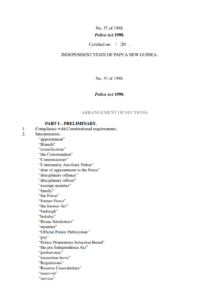POLICE ACT 1998
The PNG Police Act 1998 is an important legislation that governs the functions and operations of the police force in Papua New Guinea. It was enacted to establish an efficient and effective police service that upholds the rule of law, protects the rights of citizens, and maintains public order and safety.
The Act outlines the organizational structure of the police force, including the roles and responsibilities of the Police Commissioner, Deputy Commissioners, and other senior officers. It also sets out the powers and duties of police officers, including the power to investigate crimes, maintain public order, and make arrests.
CRIMINAL CODE ACT 1974
The Criminal Code Act 1974 is a fundamental piece of legislation that governs the criminal law in Papua New Guinea. It sets out the various offences and penalties that apply to criminal conduct and defines the fundamental principles of criminal liability.
The Criminal Code Act 1974 is a crucial legal framework that guides the prosecution and punishment of criminal offences in Papua New Guinea, ensuring that justice is served in a fair and just manner
CYBERCRIME ACT
The PNG Cybercrime Code Act is a legislation that was enacted in 2016 to address the increasing threat of cybercrime in Papua New Guinea. The Act establishes a legal framework to address various forms of cybercrime, including computer-related fraud, identity theft, hacking, and cyber bullying.
The Act defines the various cybercrime offences and the penalties for committing them. It also sets out the investigative and prosecutorial powers of law enforcement agencies with respect to cybercrime investigations and prosecutions.
The PNG Cybercrime Code Act is a significant legal framework that aims to combat cybercrime in Papua New Guinea and ensure that individuals and entities are held accountable for their actions in the online environment.

